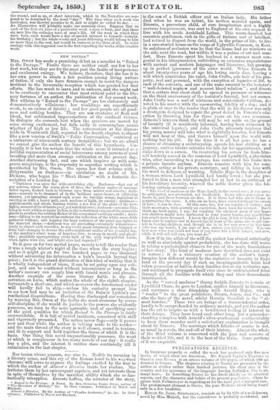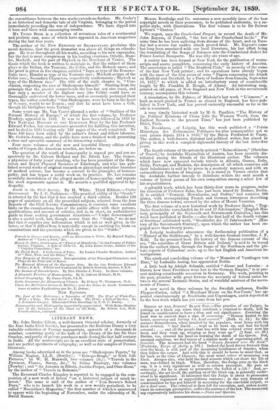PUBLICATIONS RECEIVED.
In literature properly so called the week has produced only live new books, of which three are American. Mr. Bayard Taylor's TRAVELS IN GREECE AND RUSSIA is an octavo volume of 426 pages, of which 280 are devoted to Greece. The chapters relating to Russia are presented by the author as studies rather than finished pictures, his short stay in the country and his ignorance of the language having forbidden him to at- tempt more. In describing Greece he has dwelt chiefly on its physical aspects, and the character and habits of its present population, whom he agrees with Fallmercyer in regarding as for the most port a mongrel race. The predominant element is Slavic, the pure Hellenic blood being found only in a few localities. Henry Sr. JOHN, GENTLEMAN, reminds us by its title of a well-known novel by Miss Muloch, but the coincidence is probably accidental, and the resemblance between the two works extends no further. Mr. Cooke's is an historical and domestic tale of old Virginia, belonging to the period immediately preceding the war of independence. We have dipped into it here and there with encouraging results.
MY THIRD Boos is a collection of seventeen tales of a sentimental and pietistic cast, some of which have appeared in American magazines during the last four years.
The author of' the NEW EXEGESIS or SHAKESPEARE proclaims this novel doctrine, that the great dramatist was above all things an ethnolo- gist. He is so throughout all his works, according to his new expounder, but the fact is most conspicuous in his leading creations, Othello, Ham- let, Macbeth, and the part of Shylock in the Merchant of Venice. The thesis which the book is written to maintain is, that the subject of these plays is the Italian, the Teutonic, the Celtic, and the Hebrew races ; and the proof is given in five chapters, entitled "Iago, as type of the Romano- Italic race ; Hamlet as type of the Teutonic race ; Macbeth as type of the Celtic race ; Secondary Characters, respectively confirmatory ; Shylock as type of the Hebrew race." The title of the sixth chapter is, " Con- clusion, respecting the race of Shakespeare himself." Starting from the principle that the greater comprehends the less but not vice versa, and that only a member of the highest race (the Celtic) could have so thoroughly understood the lower races, and so accurately portrayed their types, the author concludes " that Shakespeare, were he born in the heart of Saxony, would be no Teuton ; and that ho must have been a Celt, though his birthplace were Tartary."
Some years ago Mr. Van Voorst planned a series of " Outlines of the Natural History of Europe," of which the first volume, by Professor Henfrey, appeared in 1852. It was to have been followed in 1853 by THE Narenat HISTORY or THE EUROPEAN SEAS by the late Professor Edward Forbes, but circumstances prevented his fulfilling this intention, and he died in 1854 leaving only 126 pages of the work completed. To these 160 have been added by the author's friend and fellow labourer, Mr. Godwin-Austen, and the public have now a finished work presenting a clear and agreeable summary of its interesting subject.
Four more volumes of the new and beautiful library edition of the works of Cooper, the American novelist, are before us.
The question of the worth of homoeopathy is argued pro and con re- spectively by Dr. Calvert Holland and Dr. Edwin Lee. The former, a physician of forty years' standing, who has been president of the Hun- terian and Royal Physical Societies of Edinburgh, and who has pub- lished several works of original research on physiology and other branches of medical science, has become a convert to the principles of homeo- pathy, and has begun a serial work on its practice. Dr. Lee remains scornfully incredulous of the alleged merits of homoeopathy, and repeats the stock arguments against it. He accords a qualified approval to hy- dropathy.
Guide to the Civil Service. By H. White. Third Edition.—Under Government. By J. C. Parkinson.—The practical utility of the "Guide" is attested by the fact that it has reached a third edition. Besides 120 pages of questions on all the prescribed subjects, selected from the four Reports of the Civil Service Commissioners, it contains some excellent hints on the examinations, lists of the public offices with their patrons, qualifications, and amount of salaries, and is, in short, an authoritative rude to those seeking government situations.—" Under Government" is also a useful work, but, though newer than the " Guide," we do not find that it supplies any information which is not as well given in the latter, or that it differs from it materially except in omitting the hints on examinations and the questions which are given in the " Guide."
BOOKS.
Travels in Greece and Russia, wills an Excursion to Crete. By Bayard Taylor, Author of " Views a Foot," &c.
Henry St. John, Gentleman, of " Flower of Hundreds," in the County of Prince George, Virginia. A Tale of 1774-'75. By John Eaten Cooke, Author of the " Virginia Comedians," &c.
My Third Book. A Collection of Tales. By Louise Chanler Moulton, Author of " This, That, and the Other," &c.
New Exegesis of Shakespeare. Interpretation of his Principal Characters and Plays on the Principle of Races.
The Natural History of the European Seas. By the late Professor Edward Forbes, F.R.S. Edited and Continued by Robert Godwin-Austen, F.R.S. The Defines of Daundelyonn. By Mrs. Charles J. Proby. In three volumes. A Domestic Practice of Homoeopathy. By G. Calvert Holland, M.D. School Geography. By James Clyde, LL.D.
Latin Grammar for Elementary Classes. By D'Arcy W. Thompson, M.A. Choir des Meilleures Scenes de Moliitre ; avec des Notes de divers Commenta- teurs et autres Explicative, par Dr. E. Dubuc.
NEW EDITIONS.
The Last of the Mohicans; a Narrative of 1757. The Wept of Wish-Ton- Wish ; a Tale. The Red Rorer ; a Tale. The Pilot; a Tale of the Sea. By J. Fenimore Cooper. Illustrated from Drawings by F. 0. C. Harley. ,-• Homeopathy and Hydropathy impartially appreciated. With Notes illustra- tive of the Influence of the Mind on the Body. By Edwin Lee, M.D. Fourth edition, enlarged.



























 Previous page
Previous page